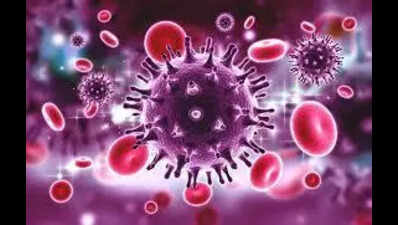- News
- City News
- chandigarh News
- At 1.27%, Punjab’s sero-positivity rate for HIV exceeds nat’l average
Trending
At 1.27%, Punjab’s sero-positivity rate for HIV exceeds nat’l average
Chandigarh: Amid its ongoing struggle with drug addiction, Punjab now faces another pressing health concern—an alarming rise in HIV/AIDS cases. The state continues to report HIV sero-positivity levels significantly above the national average, raising red flags among public health officials.
Punjab recorded a sero-positivity rate of 1.27%, compared to the national average of 0.41%. This places the state among the third highest in the country, alongside Mizoram (2.1%), Assam (1.74%), Meghalaya (1.21%), and Nagaland (1.12%), according to data shared in the 2024-25 report of the Union health ministry.
One of the primary drivers of HIV transmission in Punjab is the unsafe practice of sharing needles among people who inject drugs. In addition, the virus spreads through unprotected sexual contact, contaminated blood, and from mother to child during childbirth or breastfeeding. Public health experts stress the need for a comprehensive, multi-pronged strategy to address the issue, combining prevention, early detection, and timely treatment.
Recognising the situation's seriousness, Punjab health authorities have ramped up efforts to contain the spread of HIV. Through initiatives under the care, support, and treatment (CST) scheme, the state is actively offering treatment and care services. Punjab has 22 anti-retroviral therapy (ART) centres and one ART-plus centre.
Special attention is being directed toward individuals with sexually transmitted diseases (STDs) and reproductive tract infections (RTIs), as these conditions significantly raise the risk of HIV transmission. Women are reported to be more affected by these infections than men. To address this, dedicated clinics have been established in all district hospitals and selected sub-district health facilities. These clinics offer free diagnostic tests, drug kits, and counselling services to ensure complete treatment for patients and their partners.
Additionally, Punjab is actively working with NGOs to implement targeted interventions aimed at high-risk groups. These programmes focus on behaviour change communication, condom distribution, and awareness campaigns. At present, 71 targeted intervention projects are operational in the state, reaching out to 20,324 female sex workers, 6,087 men who have sex with men, 31,371 injecting drug users, 60,486 migrants, 36,702 truckers, and 1,415 transgender individuals.
Calling the high HIV sero-positivity rate in Punjab a matter of serious concern, Dr Rakesh Kumar Gupta, president of the Strategic Institute for Public Health Education and Research, emphasised the need for a coordinated, multi-sectoral response. He stressed the importance of strengthening harm reduction programs, particularly for people who inject drugs, alongside scaling up targeted interventions for high-risk populations. Dr Gupta highlighted that community-based outreach, increased awareness, and timely testing must be integrated with expanded access to ART services. He also underscored the urgent need to address the stigma surrounding HIV, which continues to be a major barrier to early diagnosis and treatment.
FOR GRAPHIC
Worst-hit states
State | Sero positivity
Mizoram | 2.10%
Assam | 1.74%
Punjab | 1.27%
Meghalaya | 1.21%
Nagaland | 1.12%
Tripura | 1.06%
Telangana | 0.81%
Arunachal Pradesh | 0.75%
Delhi | 0.74%
Andhra Pradesh | 0.71%
Haryana | 0.67%
Chandigarh | 0.65%
All India | 0.41%

About the Author
Vinod KumarEnd of Article
FOLLOW US ON SOCIAL MEDIA








